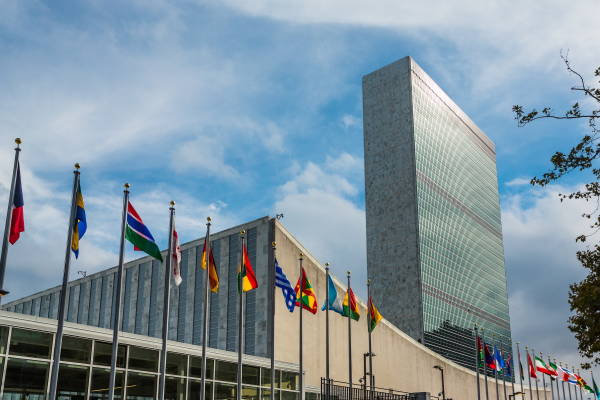Pressure from the health-harming industries of Big tobacco, alcohol, junk food and fossil fuels is undermining the robustness of the final draft of the UN Political Declaration on noncommunicable Diseases and mental health ("the Declaration"), threatening to reverse progress in the NCD response at a turbulent time for global health. The final version of the Declaration is set to be approved at the fourth UN High-Level Meeting on NCDs and Mental Health (HLM4) which will take place on 25 September at the UN General Assembly in New York.
"It looks like health-harming industry fingerprints are all over this," said Alison Cox, Director of Policy and Advocacy at the NCD Alliance. "At a time of fiscal pressures, shrinking global health funding, and increased emphasis on domestic resource mobilisation, health taxes are a golden opportunity to both generate revenue and reduce the burden of NCDs and associated healthcare costs. Yet as it stands the Declaration's text contains weaker language around taxes and lets industry out of the hook, prioritising profits over public health. Make no mistake, the Declaration in its current form is a backslide."
Seven of the top 10 causes of death globally are noncommunicable diseases. A staggering 43 million people die every year due to NCDs, accounting for 75% of all deaths worldwide. Given the scale of the emergency, it is essential to get back on track with the global NCD targets and SDG3.4 to prevent millions of avoidable deaths and illnesses.
The mandate for HLM4 was clear on the need for a concise, action-oriented Declaration, that builds on previous commitments and mobilises political will and action via measurable global targets and commitments. The current draft falls significantly short on this mandate.
The current version of the Declaration has been systematically weakened. The language on commitments has been watered down throughout, particularly on the cost-effective NCD prevention policies and fiscal measures, and the ambition of the targets in most sections has been flattened. Active commitments to "implement" and "enact" have given way to far more passive language of "consider" and "encourage". The zero draft set out a clear framework of three fast-track targets and five tracer targets. At this stage, each of the five tracer targets have been weakened.
Another area of significant backsliding from previous declarations is around social participation and the role of civil society. Civil society is only referenced once in the entire Declaration as it stands; and recognition of involvement of people living with NCDs receives a cursory paragraph.
"History has taught us that ignoring the integral role of civil society, communities and people living with diseases weakens any meaningful public health response," said Cox. "NCDs are no exception".
With just a week of negotiations remaining, the NCD Alliance is calling on governments to demonstrate true leadership and resist last-minute compromises that prioritise commercial interests over public health and reflect a genuine commitment to protecting lives.
Read full analysis of the declaration here
Further information:
Michael Kessler
NCD Alliance Media Relations
Mobile: +34 655 792 699
E-mail: michael.kessler@intoon-media.com
About the NCD Alliance
The NCD Alliance is a registered non-governmental organisation (NGO) based in Geneva, Switzerland, dedicated to supporting a world free from preventable suffering, disability and death caused by NCDs. Founded in 2009, NCDA brings together a unique network of over 500 members in more than 100 countries into a respected, united and credible global civil society movement. The movement is unified by the cross-cutting nature of common risk factors including unhealthy diets, alcohol, tobacco, air pollution and physical inactivity, and the system solutions for chronic NCDs such as cancer, cardiovascular disease, chronic lung disease, diabetes, mental health and neurological disorders.




